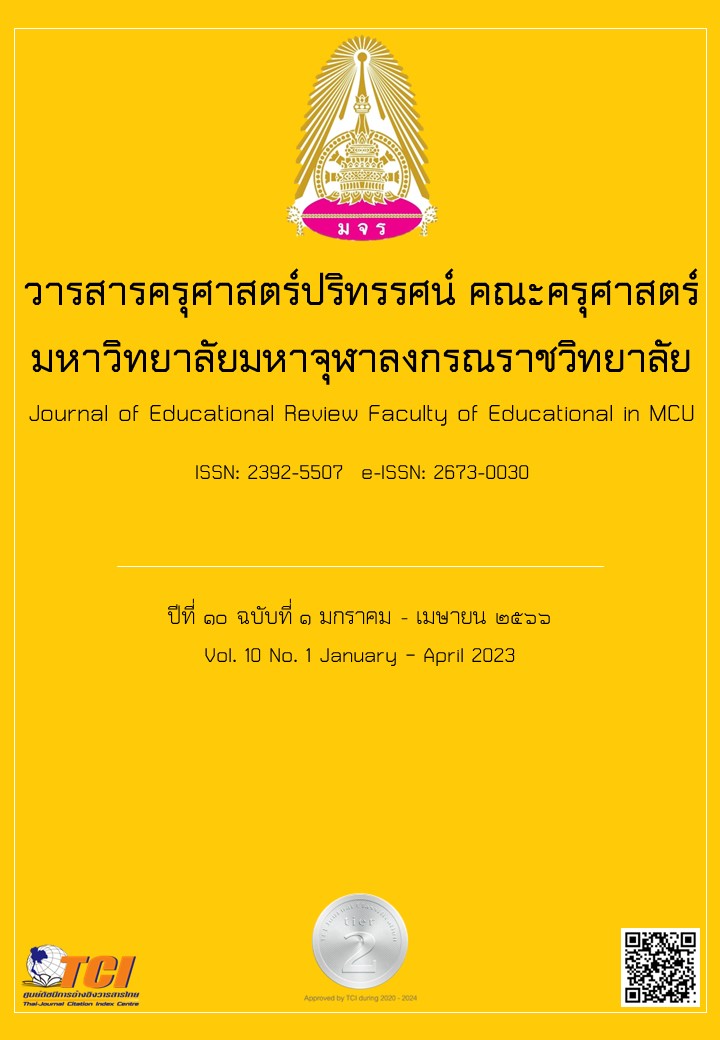MODEL OF PARTICIPATION IN EDUCATION MANAGEMENT FOR COMMUNITIES AND SCHOOLS IN NEW ERA UNDER PATTHUMTANI PRIMARY EDUCATION SERVICE AREA OFFICE 1
Main Article Content
Abstract
The purpose of this research was to develop and evaluate model of participation in education management for communities and schools in new era under Patthumtani Primary Education Service Area Office 1. There was divided into four steps; Step 1: Study condition, problems, and guidelines the model of participation in education management for communities and schools in new era under Patthumtani Primary Education Service Area Office 1. Step 2: Develop the model of participation in education management for communities and schools in new era under Patthumtani Primary Education Service Area Office 1. Step 3: Evaluate the model and, Step 4: Try out the model of participation in education management for communities and schools in new era under Patthumtani Primary Education Service Area Office 1. Sample was 431 people, they consisted of basic education board and parents. Using the table of Krejcie; & Morgan. and stratified random sampling. The research instrument was questionnaire, interview, evaluate feasibility and benefit. It was analyzed using basic statistics and content analysis. The results revealed that 1) Status of participation in education management for communities and schools in new era under Patthumtani Primary Education Service Area Office 1 in overall, performance was at highest level. The result of model development consisted of 2 components. Component 1 was participation in education management for communities and schools in new era under Patthumtani Primary Education Service Area Office 1, there were 6 steps, such as 1) Study problems/Setting policy 2) Planning 3) Decision making for action 4) Follow the plan 5) Evaluation and 6) Co-benefits component. Component 2 was arrangement in education management for schools in new era such as 1) Critical thinking and problem solving 2) Creativity and innovation 3) Collaboration teamwork and leadership 4) Communication information and media literacy 5) Cross-cultural understanding 6) Computing and IT literacy 7) Career and learning skills 8) Compassion. The result of evaluate feasibility and benefit was at highest level.
Article Details

This work is licensed under a Creative Commons Attribution-NonCommercial-NoDerivatives 4.0 International License.
ทัศนะและความคิดเห็นที่ปรากฏในบทความในวารสารฉบับนี้ถือเป็นความรับผิดชอบของผู้เขียนบทความนั้นเพียงผู้เดียว และไม่ถือเป็นทัศนะและความรับผิดชอบของกองบรรณาธิการ
กองบรรณาธิการขอสงวนสิทธิ์ในการคัดเลือกบทความลงตีพิมพ์และจะแจ้งให้เจ้าของบทความทราบหลังจากผู้ประเมินบทความตรวจอ่านบทความแล้ว
ต้นฉบับที่ได้รับการตีพิมพ์ในวารสารครุศาสตร์ปริทรรศน์ คณะครุศาสตร์ มหาวิทยาลัยมหาจุฬาลงกรณราชวิทยาลัย ถือเป็นกรรมสิทธิ์ของคณะครุศาสตร์ มหาวิทยาลัยมหาจุฬาลงกรณราชวิทยาลัย ห้ามนำข้อความทั้งหมดหรือบางส่วนไปพิมพ์ซ้ำ เว้นเสียแต่ว่าจะได้รับอนุญาตจากมหาวิทยาลัยฯ เป็นลายลักษณ์อักษร
References
กระทรวงศึกษาธิการ. (2545). รายงานการวิจัยเรื่องการมีส่วนร่วมของชุมชนในการจัดการศึกษาขั้นพื้นฐานระดับมัธยมศึกษาตามแนวพระราชบัญญัติการศึกษาแห่งชาติ พ.ศ. 2542. กรุงเทพมหานคร: โรงพิมพ์การศาสนา.
กระทรวงศึกษาธิการ. (2550). เอกสารประกอบการอบรมผู้นำการเปลี่ยนแปลงสำหรับผู้บริหาร. กรุงเทพมหานคร: กระทรวงศึกษาธิการ.
นุชา สระสม. (2560). การมีส่วนร่วมในการบริหารแบบบ้าน วัด โรงเรียน ของโรงเรียนวัดสังกัดกรุงเทพมหานคร. ดุษฎีนิพนธ์ปรัชญาดุษฎีบัณฑิต. มหาวิทยาลัยศิลปากร.
พจนารถ วาดกลิ่น. (2556). ความสัมพันธ์ระหว่างการบริหารแบบมีส่วนร่วมกับการดำเนินงานด้านวิชาการโรงเรียนในสำนักงานเขตบางกอกใหญ่ สังกัดสำนักการศึกษากรุงเทพมหานคร. วิทยานิพนธ์ศึกษาศาสตรมหาบัณฑิต. มหาวิทยาลัยเทคโนโลยีราชมงคลธัญบุรี.
พนม พงษ์ไพบูลย์ และคณะ. (2556). รวมกฎหมายการศึกษาเข้าสู่โครงสร้างใหม่กระทรวงศึกษาธิการ. กรุงเทพมหานคร: วัฒนาพานิช.
ศศิธร สุวรรณดี. (2547). คุณลักษณะของผู้บริหารที่ส่งผลต่อการปฏิบัติงาน ด้านความสัมพันธ์ระหว่างโรงเรียนกับชุมชนในโรงเรียนเทศบาล เขตการศึกษา 1. วิทยานิพนธ์ครุศาสตรมหาบัณฑิต. มหาวิทยาลัยศิลปากร.
สายฝน วิบูลรังสรรค์. (2550). การพัฒนารูปแบบการประเมินแบบมีส่วนร่วม สำหรับประเมินและพัฒนาการมีส่วนร่วมของชุมชนในการจัดการศึกษาของสถานศึกษาขั้นพื้นฐาน. ดุษฎีนิพนธ์การศึกษาดุษฎีบัณฑิต. มหาวิทยาลัยนเรศวร.
สำนักงานเขตพื้นที่การศึกษาปทุมธานี เขต 1. (2563). แผนพัฒนาคุณภาพการศึกษาสำนักงานเขตพื้นที่การศึกษาปทุมธานี เขต 1. ปทุมธานี: สำนักงานเขตพื้นที่การศึกษาปทุมธานี เขต 1.
เสรี พงศ์พิศ. (2551). ฐานคิด: จากแผนแม่บทสู่วิสาหกิจชุมชน. กรุงเทพมหานคร: พลังปัญญา.
เสาวภา ไพทยวัฒน์. (2559). ปรากฏการณ์ทางสังคมของชุมชนป้อมมหากาฬ มิติใหม่ในเส้นทางการเป็นสมัยใหม่ของไทย. รายงานวิจัย. มหาวิทยาลัยราชภัฏสวนสุนันทา.
อดิเรก บุญคง (2554). รูปแบบการจัดความร่วมมือในการจัดการศึกษาระหว่างบ้าน วัด โรงเรียน เพื่อพัฒนาคุณภาพนักเรียนของสถานศึกษาขั้นพื้นฐานในชนบท จังหวัดศรีษะเกษ. ดุษฎีนิพนธ์ปริญญาดุษฎีบัณฑิต. มหาวิทยาลัยมหาสารคาม.
อัขราธร สังมณีโชติ. (2550). คุณลักษณะของผู้บริหารสถานศึกษาที่พึงประสงค์ของชุมชน. วิทยานิพนธ์ศึกษาศาสตรมหาบัณฑิต. มหาวิทยาลัยศิลปากร.
Krejcie, R. V., & Morgan, D. W. (1970). Determining sample size for research activities. Educational and Psychological Measurement. 30(3). 607–610.


